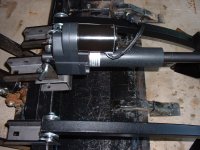BobRip
Elite Member
Is anyone concerned with using a spary lubricant on the lift arm joints instead of grease? Is this really effective?
I have considered (just thinking out loud) drilling a hole through the bolt from the head end to where the center of the joint is. Then drill into the bolt radially to this first hole. Then you could put a grease fitting in the head and pump grease in. Would this be worth it, or will these joints last forever with just a spray on lubricant.
I have considered (just thinking out loud) drilling a hole through the bolt from the head end to where the center of the joint is. Then drill into the bolt radially to this first hole. Then you could put a grease fitting in the head and pump grease in. Would this be worth it, or will these joints last forever with just a spray on lubricant.
